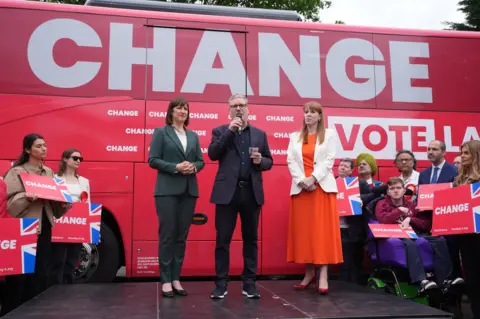General election: Conservatives pledge cash for towns as Labour vows help to work

Becky Morton,Political reporter, @beckyrmorton
 PA Media
PA MediaThe Conservatives have pledged to give 30 towns across the UK £20m each in an expansion of its levelling-up policy, if the party is re-elected.
Areas including Tamworth, Halifax, Newtown and Perth would benefit from the funding, with local people deciding how it would be used.
But Labour branded the levelling-up pledge a “phoney gimmick” that had failed to deliver economic growth.
The party said the policy was “another reckless unfunded spending commitment”.
The Liberal Democrats said the Tories had failed to deliver on their levelling up promises and the policy had “pitted councils against each other and left them begging for scraps”.
The Scottish National Party said the Tory approach had not delivered “a grain of investment in our communities”.
The promised funding would take the total number of towns on the programme to more than 100.
Prime Minister Rishi Sunak said the funding could go towards things like reviving high streets and growing local economies.
Asked whether he was trying to buy votes, given more than half of the areas had Tory MPs, Mr Sunak said an “objective set of criteria” was used to select towns for funding, looking at economic opportunity, health and life expectancy.
In a day of campaigning which focused on levelling up and jobs, both the Tories and Labour unveiled their “battle buses”, which will travel the country in the run up to polling day on 4 July.
The prime minister started his weekend in Teesside, as part of a tour of north-east England, before visiting Redcar Racecourse and a beach in Blyth.
 PA Media
PA MediaMeanwhile, Labour launched its bus – emblazoned with the party’s “change” slogan – in west London, with deputy leader Angela Rayner setting off on a 5,000-mile tour of battleground seats across the country.
Party leader Sir Keir Starmer also set out plans to reform the benefits system, which he hopes will help get two million more people back into work.
The party will aim to increase the employment rate from 75% to 80% if it wins power, partly by bringing together job centres and the careers service.
There would also be greater powers and more funding for mayors to develop localised schemes to improve employment in their areas.
There would be a particular focus on 18-to-21 year-olds, with help guaranteed to get them into work, training or apprenticeships.
The Conservatives said the plans were “waffle not welfare reform”.
Last year, the Tories announced their own plans to get people back to work, including extra support for job-seekers and tougher sanctions for people who are able to work but are not trying to look for a job.

It comes as the party seeks to move on from the row over Diane Abbott.
Speaking on the campaign trail, Ms Rayner dismissed claims she pushed Sir Keir into letting Ms Abbott run as a Labour candidate as “rubbish”.
On Friday, the Labour leader said the veteran left-winger would be “free to go forward as a Labour candidate”, after months of uncertainty about her future.
Ms Rayner said on Thursday she saw “no reason” why Ms Abbott should not be allowed to stand for the party, leading the Tories to accuse Sir Keir of caving in to pressure from his deputy.
However, Ms Rayner told the Daily Mirror: “That is rubbish.
“We both value the contribution that Diane has made to Parliament. So I don’t see any difference. And I certainly don’t push Keir around.”
Ms Abbott was suspended from the party last April for saying Jewish, Irish and Traveller people do not face racism “all their lives”.
The former shadow home secretary apologised but was not readmitted to the party until this week.
In other election news:
Related
Llyods Recruiting Engineers In India After Slashing Jobs In UK
Lloyds Banking Group is planning to hire hundreds of engineers in India as the company plans to shift its employment opportunit
Major new funding for music acts that supercharged careers of…
£1.6m Music Export Growth Scheme to support 58 independent UK artists to tour the world Funding will boost UK’s creative industries – a key growth se
Well-loved restaurant chain to close 8 venues across UK as…
A BELOVED restaurant chain has announced it will close eight venues across the UK, scrapping 158 jobs in the process.Owners are pointing the finger at Labour's
US adds 151,000 jobs in February as unemployment rate ticks…
The latest figures published by the US Bureau of Labor Statistics today (7 March) came in below market expectations, with economists polled by













